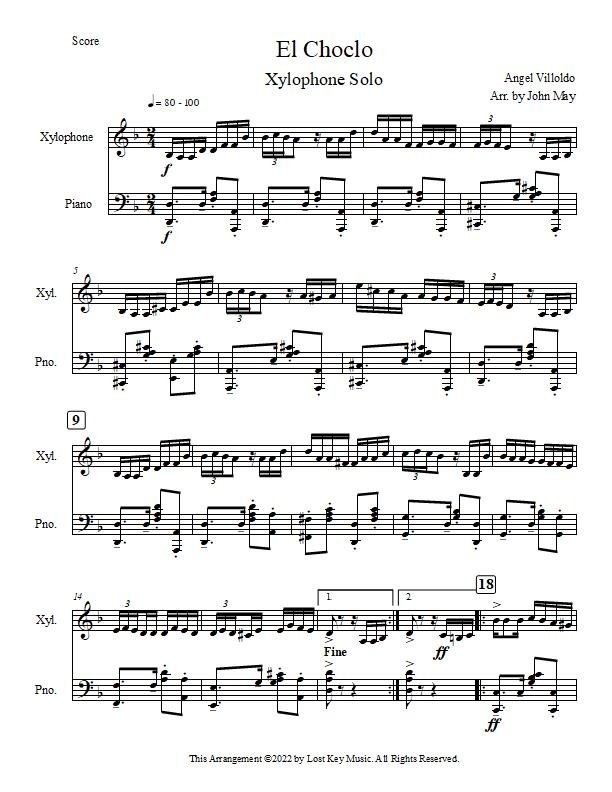Keyboard Percussion Solos
Tico Tico No Fuba (rufous-collared sparrow in the cornmeal) is a Brazilian choro song written by Zequinha Abreu in 1917. It is arranged here for xylophone solo.
Tico Tico No Fuba (rufous-collared sparrow in the cornmeal) is a Brazilian choro song written by Zequinha Abreu in 1917. It is arranged here for marimba solo.
El Choclo (The Corn Cob) is one of the most popular tangos in Argentina. It is arranged here for marimba solo. Only two mallets required.
On The Florida MPA List and Missouri Prescribed Music List
El Choclo (The Corn Cob) is one of the most popular tangos in Argentina. It is arranged here for xylophone solo with optional piano accompaniment.
Jezebel-Vibraphone Solo
$10.00
Grade 3
El Testament d'Amelia (Amelia's Will) is a popular Catalan folk song. This arrangement is a good choice for an intermediate level marimba player, or as a more lyrical program selection for the more advanced performer. Available in a 5-octave or 4.3-octave version. Digital Download contains both versions.
$12.00
Grade 4
This arrangement works the 1243 permutation as well as what I would call single vertical strokes in the context of a musical selection, which makes it more fun than exercises alone. It is playable on a 4.3 octave marimba.
On the Texas Prescribed Music List and Florida MPA
Agustin Barrios was a Paraguayan composer who wrote primarily for the guitar. It is believed that Barrios composed Julia Florida for one of his students. A Barcarola is a folk song composed in the style of Venetian gondoliers.
This arrangement is for marimba and requires four mallets. It can be performed on a 4.3, 4.5 and 5-octave marimba. The notes in parentheses are included to accommodate performance on 4.3-octave marimbas.
Duration: 4:30
On the Texas Prescribed Music List and Florida MPA
Agustin Barrios was a Paraguayan composer who wrote primarily for the guitar. It is believed that Barrios composed Julia Florida for one of his students. A Barcarola is a folk song composed in the style of Venetian gondoliers.
This arrangement is for marimba and requires four mallets. It can be performed on a 4.3, 4.5 and 5-octave marimba. The notes in parentheses are included to accommodate performance on 4.3-octave marimbas.
Duration: 4:30
Grade 2
Frederic Chopin
Arranged by John May
Prelude in B minor is from Frederic Chopin's 24 Preludes, which covers all major and minor keys. It is believed that this prelude, along with others, were played at his funeral. Nicknames given to this prelude after Chopin's death include "Homesickness" and "Tolling Bells."
This arrangement is a good choice for an intermediate four-mallet marimba player, and it can help them learn to play expressively.
To submit a purchase order, click here. You may also e-mail a PDF of your purchase order form from your business office to lostkeymusic@gmail.com
On the Texas Prescribed Music List
Francisco Tarrega (1852-1909) was a Spanish composer and classical guitarist regarded by many as "the father of the classical guitar." Adelita is a mazurka originally composed for guitar by Tarrega. The mazurka originated in Poland and was popularized by Frederic Chopin.
This arrangement for marimba can be performed on 4.3 octave marimba or larger. The notes in parentheses are intended for a 4.3 octave marimba. The tempo is indicated as Lento, but seems to work better at a faster tempo. The audio file here is at 80 bpm. However, this piece should not be performed metronomically, but rather with a more rubato style.
On the Texas Prescribed Music List
Francisco Tarrega (1852-1909) was a Spanish composer and classical guitarist regarded by many as "the father of the classical guitar." Adelita is a mazurka originally composed for guitar by Tarrega. The mazurka originated in Poland and was popularized by Frederic Chopin.
This arrangement for marimba can be performed on 4.3 octave marimba or larger. The notes in parentheses are intended for a 4.3 octave marimba. The tempo is indicated as Lento, but seems to work better at a faster tempo. The audio file here is at 80 bpm. However, this piece should not be performed metronomically, but rather with a more rubato style.















